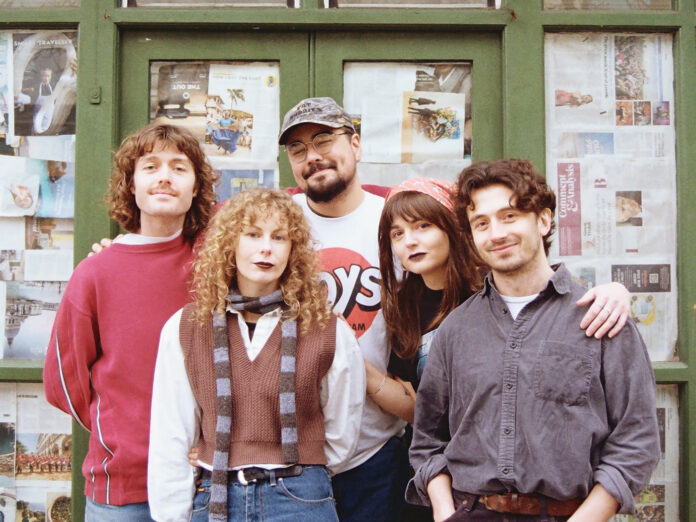A band’s early trajectory tends to follow a certain pattern. First comes the rough toil, birthing obscure songs that very few people are interested to hear, gigging in backroom bars and so on, hoping for some kind of validation. Or at least an audience. If you’re lucky, you’ll get signed. Then comes the first album, usually shortlisted from songs you’ve been fussing over for the past few years. And if you’re luckier still, there’ll be attendant live shows, an accelerated period of development and a swift return to the studio. This is exactly where Brown Horse are at.
A band’s early trajectory tends to follow a certain pattern. First comes the rough toil, birthing obscure songs that very few people are interested to hear, gigging in backroom bars and so on, hoping for some kind of validation. Or at least an audience. If you’re lucky, you’ll get signed. Then comes the first album, usually shortlisted from songs you’ve been fussing over for the past few years. And if you’re luckier still, there’ll be attendant live shows, an accelerated period of development and a swift return to the studio. This is exactly where Brown Horse are at.
The Norwich sextet seemed to arrive from nowhere with last year’s Reservoir, a remarkably assured debut that ran the tenets of classic country-rock through a noisier, post-millennial filter. But they’d actually begun as a folk quartet some six years earlier, playing covers and originals in empty pubs, before regrouping (and swelling) into something more guitar-directed. Eventually picked up by the ever-discerning Loose label, the album was immediately followed by a months-long tour of the UK, Ireland and Scandinavia, during which time they trialled the bulk of what became All The Right Weaknesses.
It bears all the hallmarks of a road album, and a great one at that. Brown Horse have taken the live momentum of the new songs directly into the studio, keeping their raw charge intact while accenting their dynamics and fine-tuning the arrangements. Crucially too, All The Right Weaknesses is more expansive than its predecessor. Emma Tovell’s pedal steel is a near-constant presence throughout, as opposed to its occasional role on Reservoir, while co-singer Phoebe Troup is more prominent, adding alternative helpings of banjo and bass.
This seems to have unlocked something extra in the Brown Horse sound. Everything is bigger, bolder, broader. The band signal their intent with opener “Verna Bloom”. Named after the American character actress who appeared in High Plains Drifter and Animal House, it’s a moving thicket of steel, accordion and Crazy Horse guitars, angled skywards by a peeling solo. Three guitars intermingle on “Corduroy Couch”, an organ bubbling underneath. Inspired by teenage memories of listening to Talking Heads and REM in the attic, the shared vocals of Troup and Patrick Turner bring extra weight and colour to the song’s disquieting mix of nostalgia and desolation.
Contrastingly, “Holy Smokes” is blessed with the kind of folk-roots swing that The Band made effortless, Brown Horse inhabiting a rural spaciousness that’s almost, but not quite, carefree. This spills over elsewhere. “Tombland” carries some of the Felice Brothers’ rugged Catskills charm, banjo pushed to the front of the mix, though slacker guitar ensures that the song doesn’t stray too far from suburbia. And “Far Off Places” is a new-school take on an old-school jig, a Celtic reel caught between a Virginia hillside and a Norfolk taproom.
Sharing the creative load adds to the richness. Whereas half of Reservoir had been written by Turner, here he contributes two songs, with Tovell, Troup, lead guitarist Nyle Holihan and keyboardist Rowan Braham picking up the rest between them. It makes for a wider palette, but no less cohesion, given that the music itself is very much a collective endeavour.
Thematically too, these songs all feel connected. The disparity between fiction and reality is a common thread. “Press your face up to the screen/And you can feel the static,” sings Turner on “Verna Bloom”, before slipping further into abstraction. On the rumbling, David Berman-like “Radio Free Bolinas” – a reference to the reclusive Californian coastal community, or maybe a spoddy pop culture nod to Return Of The Jedi – its narrator “Fell asleep on the carpet/Of a television starship”. Other songs seem caught in a form of psychic interspace, a place of dark visions and fever dreams, hovering between something unspoken yet ominous.
Notwithstanding the unresolved sense of unease and disenchantment that underpins All The Right Weaknesses, everything seems to come back to the road. It’s there in the fortified distances of “Dog Rose” and the “dawn black void” that accompanies “Radio Free Bolinas”; it sounds the bell in the title track’s hotel bar, it sours the milk in the service station coffee of “Verna Bloom”. And, perhaps most memorably, it winds through the silent miles of “Wipers”: “Bill Callahan in the van/Cutting through the car park/Kids doing handstands on the bandstand”.
Brown Horse have come a long way in a very short time, but are clearly relishing the challenge. On this evidence, they’re set to run and run.
When you purchase through links on our site, we may earn an affiliate commission. Here’s how it works.



